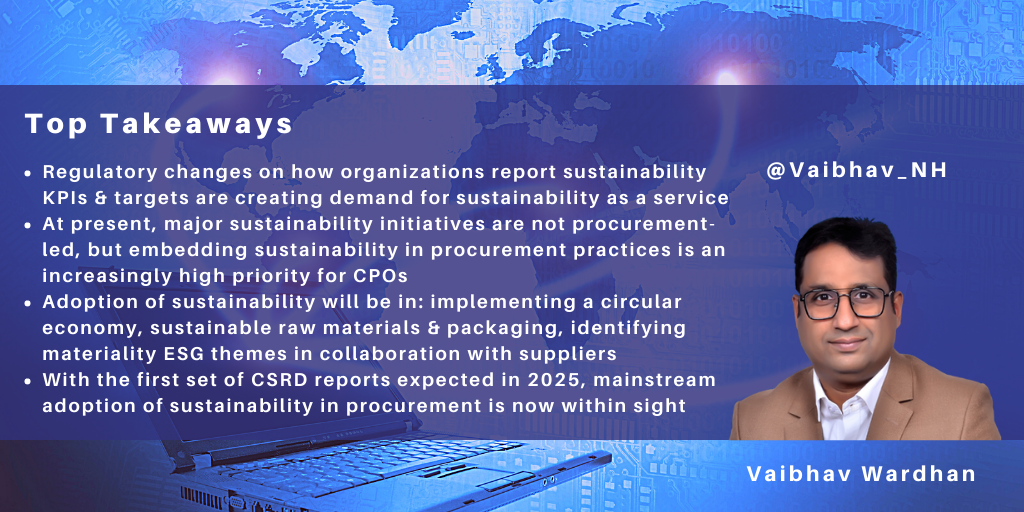posted on Jun 09, 2023 by Vaibhav Wardhan

In our recent discussions with suppliers about procurement transformation, a recurring topic was how the procurement function can help organizations meet their sustainability goals. While sustainability has become an integral business theme for organizations, many recognize they have much to do over the next few years. This blog looks at the current state of sustainability in procurement and how the function can play a broader role while leveraging sustainability services from procurement consulting and BPS vendors.
Procurement has extensive experience in areas such as labor practices and human resource management, environmental hazards, responsible sourcing, and improving spend with SMEs and diverse suppliers. But recent and upcoming regulatory changes on how organizations report their sustainability KPIs and targets, such as the EU’s corporate sustainability reporting directive (CSRD), place new demands on the function.
Sustainability in procurement
Sustainability in procurement and how to embed sustainability in procurement practices is an increasingly high priority for CPOs, though many, even those leading large procurement organizations, are still working out how best to adopt sustainability in their function. Major sustainability initiatives are not procurement-led and tend to focus on scope 1 or scope 2 emissions.
With up to 90% of an organization’s ESG risk impacted by purchased goods and services, procurement needs to have a well-developed sustainable supply chain: one of the most critical links between suppliers and the business is to drive joint sustainability programs.
The adoption of ESG considerations for supplier selection, including human resource and labor practices, diversity status, and corporate governance standards, has long been a part of a typical procurement process. CPOs now need to broaden their remit.
Sustainability areas where procurement plays a crucial role include:
- Collaborating with suppliers to identify materiality ESG themes, topics, risks, and focus areas for the organization and help to achieve those materiality goals
- Leading their organization’s focus on reporting and reducing scope 3 emissions from the supply chain
- Implementing responsible sourcing ideas such as environment-friendly products and raw materials, increasing the extent of recycling, working with suppliers to implement sustainability programs, etc.
- Including small, medium, and diverse suppliers in the sourcing process and increasing spend with these suppliers. This is a mature practice in U.S. markets but is still in the early stages in other regions
- Reducing risk associated with suppliers’ bad practices such as using child labor, environmental pollution, and waste discharge. Such third-party risks can have significant financial and brand value implications on the organization
- Implementing a circular economy with the help of suppliers to ensure resources in the economic cycle deliver the highest value add by re-integrating waste and by-products.
Some procurement services specialists have been developing offerings to help CPOs with their sustainability roadmap and drive overall sustainability goals for the organization.
Moving to sustainability as a service
Procurement consulting and BPS vendors have been developing ‘ESG as a service’ offerings, building a technology ecosystem around sustainability, and forming partnerships with the likes of Ecovadis, Scoutbee, Sievo, and Sphera. Companies like Infosys (Ecowatch), and TCS (Clever Energy, DigiFleet) have also been focusing on developing IoT, edge, and AI-based analytics tools that help them measure and report sustainability KPIs.
Offerings from major vendors include ones that help clients in:
- Driving a closed-loop procurement system: Accenture, Deloitte, TCS, and Capgemini are among those that have offerings that focus on closed-loop procurement systems and spend management, leveraging automation and analytics across the source-to-pay process and helping clients reinvest the realized value
- Commodity or category-level baseline assessments to identify and prioritize opportunities: Infosys offers advisory and managed services, which focus on sustainability assessments and identifying hotspots or opportunity areas
- Embedding sustainability criteria and metrics in the sourcing process and incorporating sustainability KPIs in the tender process: Capgemini sustainable procurement services has offerings that help upskill the procurement team with an emphasis on procurement process analysis concerning sustainability and helps the team understand sustainability KPIs in RFx process
- Analytics, reporting, and dashboards for tracking and reporting sustainability metrics: a common element of ‘sustainability as a service’
- Procurement sustainability maturity assessment and sustainability strategy: another common element that helps organizations with sustainability strategy, sustainability capability maturity assessment, and capability uplift advisory offering.
Summary
Procurement has come a long way from being a support function to being strategically significant in helping organizations with their top and bottom lines. In many industries, most medium and large organizations have extensive experience of working closely with their suppliers to optimize the supply chain and deliver a competitive advantage. But with sustainability, many procurement organizations recognize they have a long way to go. The next few years will see some innovative collaborations between organizations and their key suppliers under the sustainability agenda across a broad range of areas, including logistics and energy procurement and the use of advanced analytics and technologies such as IoT for real-time monitoring of supply chain processes.
A few large organizations are already working in multiple directions, but mainstream adoption of sustainability in procurement might take another 12 to 36 months. This is when the first set of CSRD reports will be published and sustainability reports of various organizations can be compared.
Vaibhav is a Principal Analyst with responsibility for NelsonHall's F&A & Supply Chain Transformation research program.
